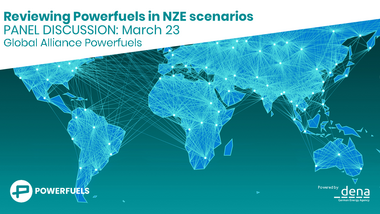The discussion was built on the Global Alliance Powerfuels’ latest modelling study on global demand, costs and trading volumes of powerfuels in an energy system that reaches carbon neutrality by 2050. Taking up the results of the study, the panellists discussed central assumptions and results for net-zero emissions scenarios, alongside implications arising for global policymaking from the use of powerfuels to defossilise different economic sectors.
Eight proven experts joined the panels as speakers:
- Dr. Dolf Gielen, Director Innovation and Technology, IRENA
- Prof. Christian Breyer, Professor of Solar Economy, LUT University
- Dr. Falko Ueckert, Head, National Energy Transitions Team, PIK
- Anders Nordstrøm, Vice President, Head of Hydrogen, Ørsted
- Marcel Keiffenheim, Head of Policy and Communications, Greenpeace Energy
- Karen Perrey, Energy Strategy and Policies, Covestro
- Dr. Onur Özgün, Lead Modeller of Energy Transition Outlook, DNV
- Sverre Alvik, Director of Energy Transition Research Programme, DNV
The discussion, although carried out between experts representing a wide range of different industries and perspectives, resulted in broad consensus on various topics. Most importantly, all speakers agreed that powerfuels will play a role in reaching GHG emission reduction targets across sectors. It was further highlighted that more modelling studies were required to evaluate the role of powerfuels, taking into consideration the significant upscaling of powerfuels production needed to ensure the cost reductions required for their market integration. A failure to ramp-up the market for powerfuels would constitute a risk for the energy transition towards a net-zero emissions energy system according to the speakers. It was added that considerable synergies were to be derived when integrating the market ramp-up of powerfuels and renewable electricity.
As for regulatory and policy implications, the speakers agreed that changes to the regulatory framework would be needed to establish powerfuels as competitive renewable alternatives to fossil energy carriers. In that, central policy instruments and levers that were mentioned included CO2 pricing schemes as well as specific incentives and/or mandates for the use of powerfuels. As concrete examples, several speakers mentioned how existing CO2 pricing schemes should be expanded, possibly across sectors and regions. In addition, according to the speakers, specific policies continue to needed to support both direct electrification options and the use of powerfuels. Mandates and contracts for difference were named in the discussion as possible instruments to ensure that funding is not only provided on a project basis but that long-term market incentives are established. The speakers further highlighted that transparent and recognised certification of the ‘green’ property of powerfuels was needed, especially in a global market, to facilitate their tradability.
While the discussion hence included specific recommendations and suggestions for future global modelling studies as well as policy instruments to facilitate reaching net-zero emissions across sectors, it became apparent that the variety of questions on the role of powerfuels that were raised could not be answered in one event alone. The Global Alliance Powerfuels is therefore looking forward to continuing the exchange on pathways towards carbon neutrality with the speakers and other interested stakeholders.
Download the presentation and the agenda here:






